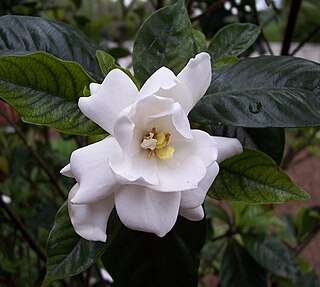
Gardenia is a genus of flowering plants in the coffee family, Rubiaceae, native to the tropical and subtropical regions of Africa, Asia, Madagascar and Pacific Islands, and Australia.
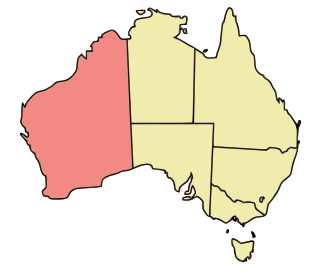
Western Australia occupies nearly one third of the Australian continent. Due to the size and the isolation of the state, considerable emphasis has been made of these features; it is the second largest administrative territory in the world, after Yakutia in Russia, despite the fact that Australia is only the sixth largest country in the world by area, and no other regional administrative jurisdiction in the world occupies such a high percentage of a continental land mass. It is also the only first level administrative subdivision to occupy the entire continental coastline in one cardinal direction.

Atractocarpus fitzalanii, the brown gardenia or yellow mangosteen, is a species of flowering plant in the family Rubiaceae found in tropical Queensland in Australia. The beautifully scented flowers and lush growth has seen this plant enter cultivation in subtropical gardens in Eastern Australia.

Atractocarpus benthamianus is a species of flowering plant in the family Rubiaceae growing in eastern Australia. It is an understorey species of subtropical and tropical rainforest on fertile soils. The natural range of distribution is from Forster, New South Wales to central Queensland. This plant features beautifully scented flowers.

Atractocarpus is a genus of flowering plants in the family Rubiaceae. Its members are commonly known as native gardenias in Australia. The genus name is derived from the Ancient Greek terms atractos "spindle", and karpos "fruit", from the spindle-shaped fruit of the type species.

The Kimberley tropical savanna is a tropical and subtropical grasslands, savannas, and shrublands ecoregion in northwestern Australia, covering portions of Western Australia and the Northern Territory south of the Timor Sea.

Pindan is a name given to the red-soil country of the south-western Kimberley region of Western Australia. The term comes from a local language and applies both to the soil and to the vegetation community associated with it.

Grevillea stenobotrya is a shrub or small tree in the family Proteaceae that is endemic to arid regions of Australia. Common names include rattle-pod grevillea, sandhill grevillea, sandhill oak and sandhill spider flower.

Acacia monticola, commonly known as red wattle, gawar, curly-bark wattle, curly-bark tree and hill turpentine, is a species of plant in the legume family that is native to northern Australia.
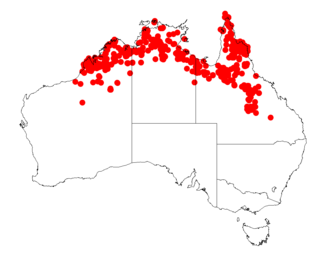
Acacia platycarpa, commonly known as the pindan wattle or ghost wattle, is a species of plant in the legume family that is native to northern Australia from Western Australia through the Northern Territory to Queensland.

Grevillea refracta, commonly known as the silver-leaf grevillea, is a species of plant in the protea family that is native to northern Australia.

Lysiphyllum cunninghamii is a species of plant in the family Fabaceae. It is native to northern Australia where it occurs from Western Australia through the Northern Territory to Queensland.
Premna acuminata, commonly known as the firestick tree, or ngalinginkil in the Bardi language, is a species of plant in the mint family. It is native to northern Australia where it occurs from Western Australia through the Northern Territory to Queensland.
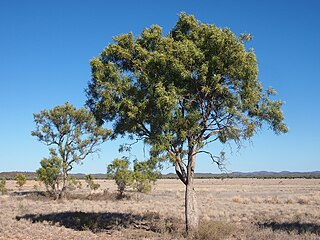
Atalaya hemiglauca, commonly known as whitewood or cattle bush, is a species of plant in the soapberry (Sapindaceae) family. It is native to northern and inland Australia where it occurs from Western Australia through the Northern Territory and South Australia to Queensland and northern New South Wales.
Pavetta kimberleyana is a species of plant in the family Rubiaceae. It is native to northern Australia where it is largely restricted to the Kimberley region of north-western Western Australia.

Melaleuca glomerata, commonly known as the desert honey-myrtle, inland paperbark or white tea-tree is a plant in the myrtle family Myrtaceae native to inland Australia. It is a small tree or shrub growing in arid areas, often in creek beds and shallow depressions.
Gardenia faucicola is a species of plant in the family Rubiaceae native to northern Australia.

Gardenia fucata is a species of plant in the family Rubiaceae native to northern Australia.
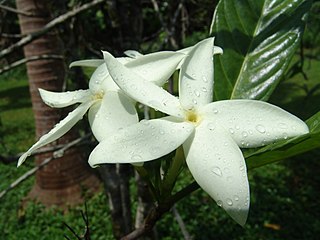
Atractocarpus hirtus, commonly known as the hairy gardenia or native loquat, is a plant in the madder family Rubiaceae, a large family of some 6,500 species with a cosmopolitan distribution. This species is endemic to north-east Queensland, Australia.
Christopher Francis Puttock, often cited as C.F.Puttock, is an Australian botanist and taxonomist who has interests in the Rubiaceae and Asteraceae flowering plant families as well as Pteridophyta (ferns) and Rhodophyta.














